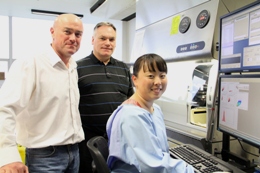30 September 2014
 Vaccines to treat infectious diseases, allergies and cancers are being developed in Adelaide under a collaborative research partnership between the University of South Australia and Sementis Ltd.
Vaccines to treat infectious diseases, allergies and cancers are being developed in Adelaide under a collaborative research partnership between the University of South Australia and Sementis Ltd.
UniSA’s Experimental Therapeutics Laboratory and the Melbourne-based biotech company are working on vaccines for mosquito-borne Chikungunya virus, peanut allergy, prostate cancer and melanoma.
The partnership is currently undertaking research activities, based out of the University’s City East campus, worth in excess of $1 million per annum.
Head of the Experimental Therapeutics Laboratory Associate Professor John Hayball says the partnership is aimed at developing a vaccine platform to ‘rapidly apply’ to the unmet medical conditions which collectively affect hundreds of thousands of people around the world.
“From our vaccine platform, we’re using genetic engineering techniques to insert antigens from different diseases … like Chikungunya virus to make the Chikungunya vaccine, allergens from peanuts to make the peanut allergy vaccine, and tumour-specific antigens for prostate cancer and melanoma vaccines,” Assoc Prof Hayball says.
“The platform is a bit like a cassette system that we can plug and play – so we plug the platform with different antigens to target a specific condition. It’s not a one-product platform.”
Assoc Prof Hayball says work is most advanced on the Chikungunya virus vaccine.
“With Chikungunya outbreaks on the rise world-wide, a protective vaccine is desperately needed,” he says.
“In pre-clinical testing, our vaccine has provided protective immunity to mice challenged with Chikungunya virus. The next step is to manufacture a batch of the vaccine ready for clinical trials."
The peanut allergy vaccine, which is also in the pre-clinical testing phase, will be a treatment vaccine but can also be used for protection.
“The peanut allergy vaccine will work by re-educating the immune system in such a way that people no longer respond to peanuts with anaphylactic shock,” Assoc Prof Hayball says.
“With three per cent of Australian children now allergic to peanuts, we’re working to reduce the impact of peanut allergy on the community.”
Assoc Prof Hayball says the prostate cancer and melanoma vaccines are longer-term goals, with research on both still in the discovery phase.
Sementis Chief Executive Officer and Chief Scientific Officer Dr Paul Howley says that through the partnership with UniSA, the company looks forward to delivering practical therapeutic solutions to diseases affecting so many people.
“This partnership gives us access to high quality scientists with expertise in the field of immunology and molecular virology and we provide the environment and infrastructure required for vaccine development that enables academic research to be transitioned smoothly into product development that meets industrial and regulatory needs,” Dr Howley says.
Assoc Prof Hayball says the partnership is a great example of how industry and academia can work together synergistically
“This a great example of academic and industry-led research coming together to develop the advances from our clinical work into products and treatments for the wider community,” he says.
The partnership between UniSA and Sementis started in 2012, then employing just one researcher. It has grown rapidly in just three years, with six full-time staff now employed in the Experimental Therapeutics Lab, and supporting a PhD candidate.
The partnership was recently awarded a Department of Industry Entrepreneurs’ Infrastructure Program ‘Researchers in Business’ Postdoctoral Fellowship to fund Dr Tamara Cooper as a research fellow in the vaccines project.
Contact for interview:
UniSA’s Assoc Prof John Hayball office (08) 8302 1202 mobile 0403 820 060
Sementis CEO Dr Paul Howley mobile 0438 048 613
Media contact: Kelly Stone office 8302 0963 mobile 0417 861 832 email Kelly.stone@unisa.edu.au




